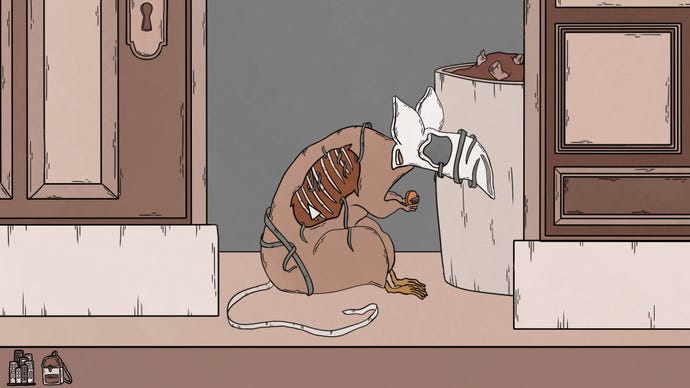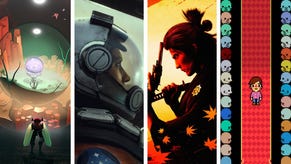Birth review: a comforting puzzle game about death and decay
A cosy conversation about mortality
Solo dev Madison Karrh’s point-and-click puzzler Birth really caught me off-guard. From the look of the screenshots, I was expecting a creepy story in the vein of Little Misfortune or Fran Bow, but instead Birth is infinitely more introspective. Sure, it’s a game about death, decay, and loneliness, but it’s told in the most gentle and genuine way possible. Its themes are heavy, but the game could not be more light-hearted. I have no idea how it does it, but Birth is weirdly the most wholesome yet creepy game I've ever played.
In it you play as a lonely soul who decides to make a friend, but instead of joining a murder mystery book club or online chat room for sharing crotchet patterns, they decided to make their mate from scratch - Frankenstein style. Leaving your house, you get to poke around the surrounding shops, cafes, museums, and apartments looking for puzzles to solve, receiving organs and bones in return.
Seeking out hidden disembodied body parts isn't really my vibe for a day out, but this city isn't like any I've seen before. Like the rest of the game, it's cute and creepy: Coraline meets Alice In Wonderland meets a plague doctor’s medical textbook. The residents of this city are strange beaked beings, with gaping eye holes and exposed bones, and even though they look like they’d go feral on a sales rack in Hot Topic, they're all acting pretty casual, and doing normal people things like wearing cosy sweaters and hanging out in cute coffee shops. It’s both alien and familiar, which is exactly how I would see the world if I felt lonely in a big city.
.jpg?width=690&quality=80&format=jpg&auto=webp)
As you poke your mouse into the nooks and crannies of the city, you’ll find a number of puzzles. They vary in simplicity from little interactive pictures, like clicking on an egg to crack it open revealing a twisted rabbit body inside, to minor brain teasers, like working out how many teeth, acorns, and spiders someone wants in their mug of tea. There are also some physics-based… scenes? They’re not really puzzles, but rather fun, clumsy interactions. In one I tried to carefully pour some pebbles from a beaker into a jar, but used too much force and caused a comical small hail storm of teeny tiny rocks. The shopkeeper didn’t seem to mind my antics, though.
With no distracting dialogue or text, this laid-back puzzle solving together with a loop of calming music makes it easy to get into a sort-of flow-like state when playing. It’s something Ed also picked up on in his brief meeting with Birth at Summer Games Fest. It’s a very gentle game even if you are continually messing around with bones, eyeballs, bugs, and loose teeth.
Sure, sometimes the body parts and decay can be a bit gross, but there’s off-beat humour to the grossness which I appreciate. In one section, there’s a key nestled in an open wound in someone’s forearm, so you need to click on the wound to make it big enough to fish the key out - and each time you click, it makes this weird squelching noise like someone's stepping on a wet Victoria sponge.
.jpg?width=690&quality=80&format=jpg&auto=webp)
.jpg?width=690&quality=80&format=jpg&auto=webp)

.jpg?width=690&quality=80&format=jpg&auto=webp)
Birth, then, is funny and grim in all the right ways, but it’s also incredibly sentimental too. As I made my way through the city, I noticed that everyone was coupled up with lovers or friends in some way: cuddling on a park bench, playing a board game together, or looking at art in a gallery. Everyone had someone. Even those who looked alone at first would have a cute couple selfie as their phone background or a framed picture of their partner in their home.
That pang of loneliness is a bittersweet realisation that I’m sure many of us have felt at one point; I mean we had two years of a global pandemic to thank for that, and finding these sentimental pockets of adult life is something that Karrh is great at. Their previous game Landlord Of The Woods grapples with the lack of motivation and meaning some feel in their early twenties, and wow do I relate to that.
And like Landlord Of The Woods, Birth is a short, sweet game that feels incredibly human, even though it features a world that, at first sight, couldn’t be further from our own.
.jpg?width=880&quality=80&format=jpg&auto=webp)



